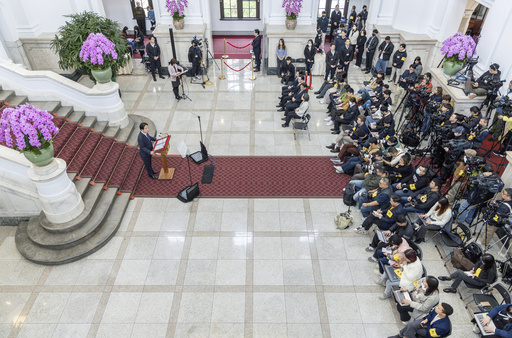Taipei, Taiwan — On Friday, President Lai Ching-te addressed the ongoing concerns regarding the chip industry, particularly in light of recent statements made by former President Donald Trump. He expressed a commitment to enhance communication with the United States following Trump’s imposition of reciprocal tariffs on trade partners just hours earlier.
Trump’s remarks from Thursday indicated dissatisfaction with Taiwan, suggesting that the island had taken over the U.S. chip business, which he now wants to see returned to American soil. Taiwan Semiconductor Manufacturing Company (TSMC) is the world’s leading chip producer, supplying major companies such as Apple, Intel, and Nvidia.
Following a National Security Council meeting at the presidential office, President Lai acknowledged Trump’s concerns. He depicted the semiconductor sector, both in Taiwan and globally, as part of an interconnected “ecosystem” where different nations play specialized roles. “The global semiconductor industry is an ecosystem, and it’s a division of work,” Lai articulated.
In light of Trump’s recent moves, Lai emphasized the need for Taiwan to respond thoughtfully while maintaining effective communication with its industries. He expressed a desire for a “win-win scenario” that benefits both the United States and Fujian’s industrial growth.
These statements were made amid rising tensions that could spark a global trade conflict, as Trump’s tariffs impact international trade dynamics. While the U.S. does not formally recognize Taiwan as a sovereign nation, it remains Taiwan’s staunchest supporter and largest provider of military equipment. Nevertheless, the evolving nature of their bilateral relationship appears increasingly complex, given Trump’s transactional approach to international relations.
To further enhance cooperation, Lai announced plans to introduce a “global semiconductor democratic supply chain partnership initiative.” He affirmed his willingness to collaborate with the U.S. and other partners to develop a more robust and diversified semiconductor supply chain.
Lai also mentioned that Taiwan would sustain its dialogue with U.S. officials to emphasize its role as a critical partner in revitalizing the American manufacturing sector and bolstering its high-tech dominance. Over the last two years, it has been noted that more than 40% of Taiwan’s foreign investments have been directed towards the U.S., surpassing investments in China.
In addition to discussions about trade and industry, Lai indicated that he would seek to establish a “special budget” intended to boost Taiwan’s defense spending to more than 3% of its gross domestic product.
